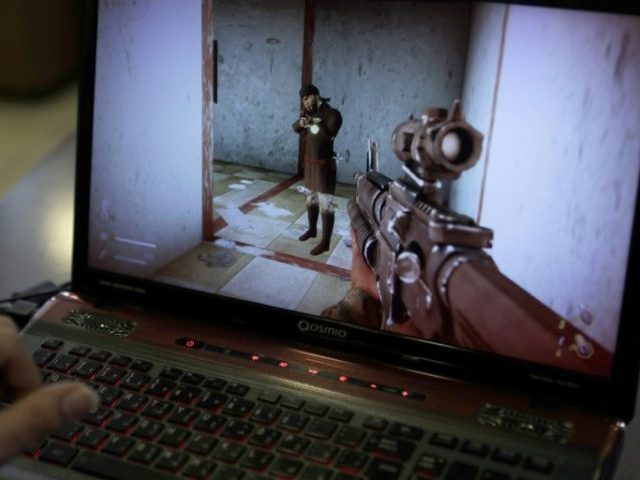Too many people around the world “just don’t like us,” and “violent video games” have played a role in global anti-American violence, Marianne Williamson, the breakout star of Tuesday’s CNN Democrat Party debate, posits on her website.
Williamson became the most searched presidential candidate in the Democrat field Tuesday night after rejecting the other candidates’ “wonkiness” and questioning their commitment to the ideals of their party, referring to President Donald Trump as a “dark psychic force” that detailed policies will not defeat in an election.
Moderators spent only a small fraction of the more than two-hour debate on foreign policy, and Williamson did not participate in that part of the debate. In her closing statement, however, she condemned current American foreign policy as being “all about symptoms and not about cause.”
“We need to talk about the fact that the United States has sacrificed our moral leadership–the fact that countries see us not only domestically, but internationally, with policies that simply support our corporate overlords,” she asserted, adding, “the fact that our national defense agenda is driven more by short-term profits for defense contractors than by genuine peace-building.”
Williamson’s “National Security & Peace-Building” policy page on her website does not provide many more details about what foreign policy issues Williamson would prioritize. It does not name a single other country in its list of policies or identify any specific threats to the United States or bilateral relationships she considers particularly important. Instead, Williamson laments on her website that America has not made amends for how it has “glorified violence” and that using military action against threats to the homeland is an “increasingly obsolete” approach to national security.
“The United States needs to recognize the ways that we have subtly and not-so-subtly glorified violence,” Williamson states on her website. “From violent video games to seemingly endless military adventures, each of us might ask ourselves, ‘What is our seeming resistance to peace?’”
Williamson stopped short of prescribing policy to stop violent video games, as many within her party have done throughout the short history of the medium. Democrats famously led the 1993 congressional hearings on violence in video games, where Sen. Joe Lieberman (D-CT) remarked that the Nintendo Super Scope, a state-of-the-art virtual gun at the time, “looks like an assault weapon.” More recently, many on the left have objected to video games as being insufficiently inclusive of women and minorities and pressured programmers to design games more favorable to their worldview.
Williamson went on to argue that people around the world hate America.
“America’s problem is not just how many people in the world hate us. It’s also how many people just don’t like us anymore, and are, therefore, willing to go along with those who seek to harm us,” Williamson continued. “Just as we have learned that health is not the absence of sickness, but rather sickness is the absence of health, we are learning that peace is not the absence of war, but rather war is the absence of peace.”
She proposed that Americans “must decide, as a generation, if in the 21st century we wish to see an America that is a leader in war or a leader in peace.” The solution is a “10- to 20-year plan for turning a wartime economy into a peacetime economy,” one that would ensure that current members of the military and those who profit from manufacturing wartime equipment can still feed their families.
Those currently in the “wartime economy” would, in Williamson’s presidency, receive jobs in infrastructure development and combatting climate change. Williamson also proposed a “Department of Peace” for the “amelioration of unnecessary human suffering” anchored in an empowered diplomatic force. Her website does not explain where the funding for the department would come from or list specific initiatives it would take on.
Williamson’s other international efforts include proposing an optional one-year “national service” program and the expansion of veterans’ services. Here, too, Williamson did not provide specifics on funding for the programs, details on what they will do, or what responsibilities its officers will have.
Williamson has been more specific in her proposals for domestic issues – supporting at least $100 billion in reparations for slavery and a constitutional amendment to reserve funding for political campaigns in Tuesday’s debate – but has largely argued that “conventional politics” will not defeat President Trump in the 2020 election.

COMMENTS
Please let us know if you're having issues with commenting.